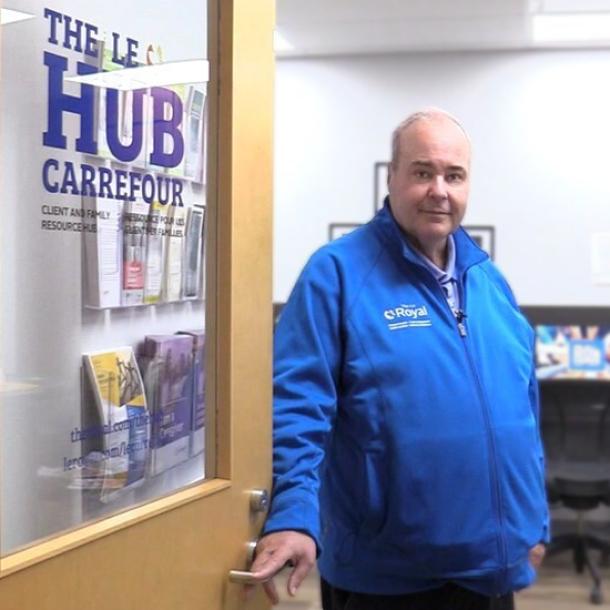If Kevin Patrick had only one word to describe The Royal’s Client and Family Resource Hub, it would be connection.
The Hub opened its doors to connect people to resources and services and bring together research and care. One year later, that sense of connection is stronger than ever.
This month marks the first anniversary of The Hub. Patrick was part of the team behind its development and is now a supervisor.
The Hub is often referred to as a “one-stop-shop” for clients and families at The Royal. It’s a large, bright room located near the main entrance of the Royal Ottawa Mental Health Centre. At a desk near the door, a friendly volunteer – referred to here as a concierge – greets people as they come in.
Computer stations and a comfortable seating area with a couch and chairs are likely the first things visitors will notice. Shelves with DVDs line one wall, and a new electric piano graces the other. Less obvious is a printer tucked away in the corner, available to anyone who needs to print out forms or information related to a new diagnosis.
Who visits The Hub?
After a full year of operation, Patrick and his team better understand who is using the space and why.
The average number of monthly visitors to The Hub has increased fourfold since it first opened, with 322 visits in April 2024 alone. Eighty-one per cent of visitors were clients, 15 per cent were staff members, and four per cent were family members of Royal clients.
“At first, we didn't know what people would come in for, but we were not surprised by all the people wanting just to connect or pick up resources,” says Patrick, who estimates about two-thirds of visitors to The Hub are looking for support for a mental health or substance use health issue.
Patrick describes the four percent of Hub visitors who are family members or caregivers of loved ones of clients at The Royal as often being in “dire straits.” He describes a father who came in looking for advice about his adult daughter, who’d been discharged from another institution without much support. The concierge was able to help by providing a listening ear, connecting them to resources in the community and introducing the idea of peer support.
“Meaningful connections are made here every day,” says Patrick. He shares an example of a young man who wanted to speak to someone about his anxiety. “He didn’t know where to go for help, so we guided him to AccessMHA, a free online service that helps people in eastern Ontario find services for mental health and substance use health issues.”
Building relationships with staff has been vital to The Hub’s success. Patrick is grateful for the recreation therapists, nurses, and social workers who introduce their clients to The Hub and bring them down for a tour.
Plans for The Hub
Patrick is keen to see more researchers partnering with The Hub. A new movement and music group exemplifies how care and research intersect. This therapeutic group meets weekly with a trained facilitator at The Hub. Participants have an opportunity to enjoy some music, and wellness surveys help researchers investigate the effect of music on well-being. It’s a symbiotic relationship that happens to be a win-win for everyone.
Peer support services are central to The Hub. Peer support in mental health care is about connecting with someone who has a firsthand understanding and can offer empathy, encouragement, and hope based on their lived experiences. Peer support occurs in group settings or one-on-one, and it's regarded as a valuable complement to professional therapy and treatment.
Individuals looking for peer support can find it at The Hub through existing programs at The Royal or through community partners.
Patrick sees peer support as a huge opportunity for growth within the organization. New peer support programming through The Hub includes the addition of two new groups for the African, Caribbean, and Black community. Peer support for people who are Indigenous or part of the 2SLGBTQIA+ community is in the planning stages. Peer support for families is just around the corner.
“Family peer support is new, and it’s so close to my heart because you're helping people move forward and helping them navigate mental health challenges,” says Patrick.
Christine, a peer support specialist for families in the Integrated Forensic Program, knows firsthand how beneficial peer support can be. “There's something very valuable about speaking with someone with similar lived experience,” she says.
“Meaningful connections are made here every day.”A key part of her role is helping people find ways to ease their stress and avoid burnout. “You're only going to be able to help your loved ones if you are in a good place yourself,” she says.
In the coming months, The Hub is poised to expand community partnerships. This past year, Patrick has been working closely with the Ottawa Black Mental Health Coalition and the Canadian Women of Colour Leadership Network. One project involved the development of special training for Black peer supporters.
Patrick credits Royal staff for their help, his hard-working concierge team, and the philanthropic support of Johannes Ziebarth of Ziebarth Electrical Contractors Ltd., for being a big part of making it happen.
If there’s one thing Patrick would like people to know, it is that anyone is welcome to drop by The Hub, regardless of whether they’re receiving services at The Royal.
“Anyone from the community can come in and talk with us – it's a safe and welcoming spot,” says Patrick. “If your family is struggling and looking for a place to ask questions and learn something, we're here.”
For information, online resources, and opening hours, go to theroyal.ca/thehub.

